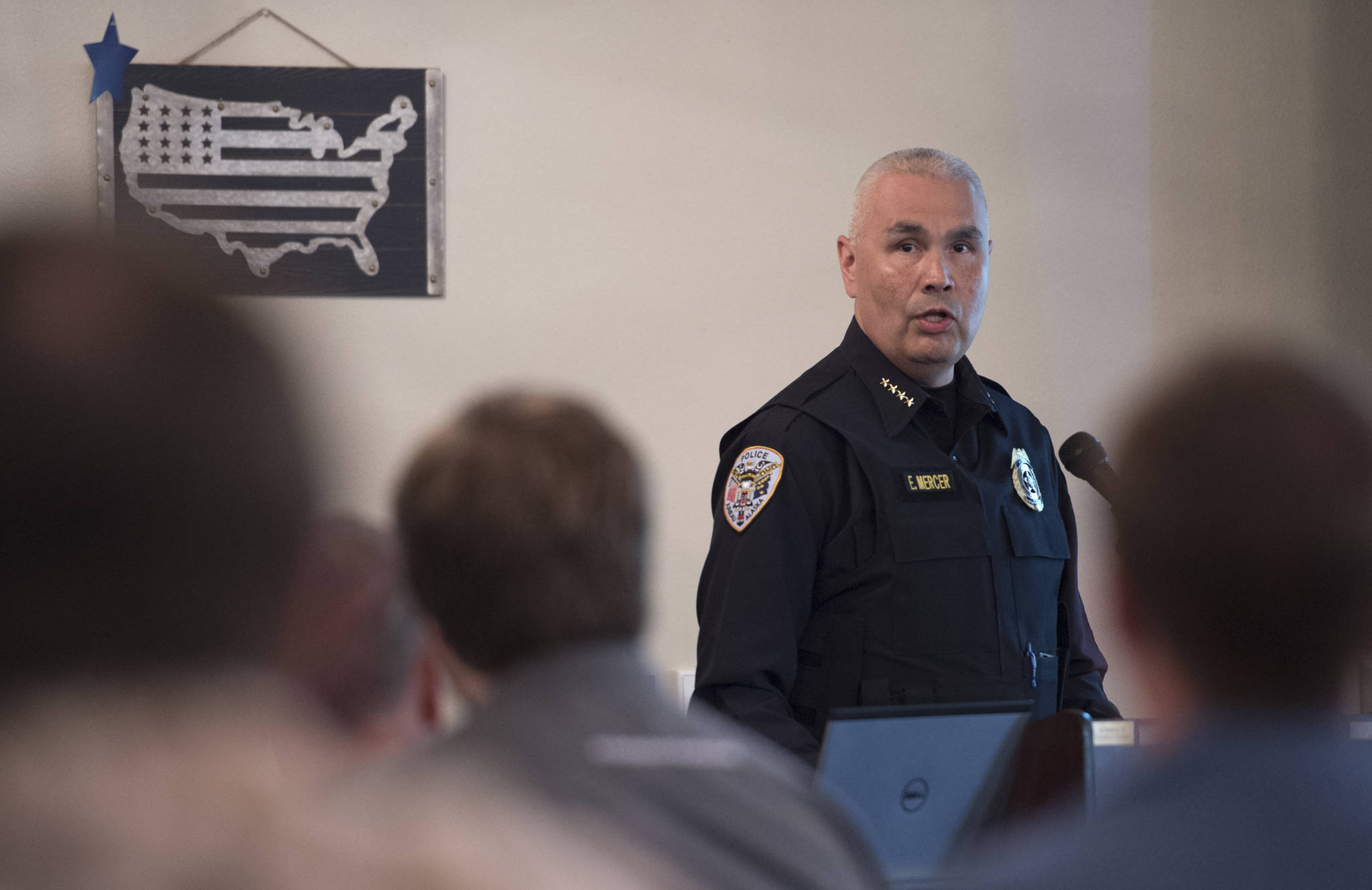Burglaries, thefts, robberies and aggravated assaults in the first quarter of 2018 are down compared to the first quarter of 2017, according to numbers shown to the Juneau Chamber of Commerce on Thursday.
Juneau Police Department Chief Ed Mercer and Deputy Chief David Campbell spoke at the Chamber’s weekly luncheon about crime statistics, drug use in Juneau and staffing challenges among other topics.
Part 1 crimes — homicides, rapes, robberies, aggravated assaults, burglary, theft, vehicle theft and arson — are down by 18 percent from the totals after the first quarter of 2017, according to Mercer and Campbell. Burglaries in particular, which have spiked in recent years, were down by 28.2 percent (from 110 to 79) in the first quarter this year compared to 2017, Mercer said.
Part of the reason JPD has been able to better enforce these crimes, Mercer said, is officers know who to look for.
“We see names come up on the radar over and over and over,” Mercer said, “and I can tell you that we focus on that and we work with our prosecutors to try to come up to solutions of either getting these individuals charged and convicted of a crime … or getting these people help.”
Vehicle thefts have been the one major increase, the chiefs said. In the first quarter of 2017, there were 19 vehicle thefts, and there were 33 over the same span in 2018. That’s a 73 percent increase. Though it might seem odd that vehicle theft is on the rise in a landlocked town, Mercer said, many of the situations they’ve seen have been people who break into a home, steal items and then use the car at the home as a getaway vehicle of sorts. They ditch the car somewhere, Mercer explained, and take the stolen goods.
Mercer said the officers understand that the driving force behind much of this crime is drug use. He pointed out in his presentation that the cost of heroin and methamphetamine is higher in Juneau than it is in the Lower 48, and that high cost of funding an addiction can lead people to steal.
JPD estimates show that a gram of meth is worth about $80 per gram in the Lower 48 and $273 per gram in Juneau, and that a gram of heroin is between $60-100 in the Lower 48 and nearly $500 in Juneau.
Both Mercer and Campbell said community members can help this drop in crime continue by reporting crimes as soon as possible. Campbell said there have been some crimes this year where people have reported them as long as 10 hours after they happened. By that time, obviously, the criminals are long gone, Campbell said.
The two chiefs also talked about the value of people getting to know their neighbors. The more neighbors who are looking out for each other, they said, the more these crimes can get reported quickly. Forming neighborhood watch groups, downloading apps such as Next Door and installing cameras at home are also good ideas, Campbell said.
Taking an untraditional approach
Even with the hiring of four new officers this month, JPD is still down eight officers, Mercer said. This is an improvement from the 12 vacancies there were when he took over as chief last summer, Mercer said, but they’re still doing everything they can to fill their ranks.
[Meet the three police academy graduates joining JPD]
Campbell said the average stay of an officer at JPD is 4.4 years. One of the reasons people leave, both he and Mercer said, is because sometimes people move to Juneau from out of state and they or their families have a hard time with the adjustment and want to be closer to family.
He said he doesn’t fault them for wanting to be near family, but said those kinds of cases have convinced the chiefs to look locally and regionally for candidates. The three officers who graduated from the Public Safety Academy in Sitka earlier this month were local hires, Campbell pointed out.
They’re even taking what Campbell called an “untraditional approach,” in looking to all ages of applicants. Mercer mentioned one hire recently who was a 40-year-old Capital Transit employee who decided to make a career change. That hire, he said, worked out well and the department is open to adding officers of all ages and experience levels.
“We’re down eight (officers),” Campbell said. “It’s not an impossible number, but we have to start thinking non-traditional. We can’t be thinking of that 22-year-old who’s fresh out of college or fresh out of the military, because that’s a really small subset of the population.”
• Contact reporter Alex McCarthy at 523-2271 or amccarthy@juneauempire.com. Follow him on Twitter at @akmccarthy.

